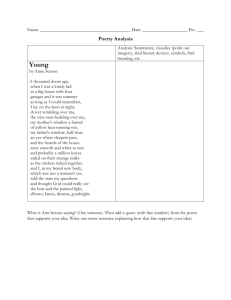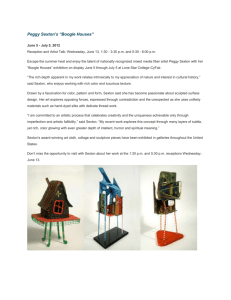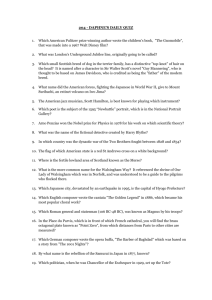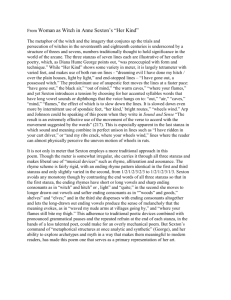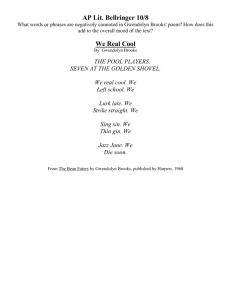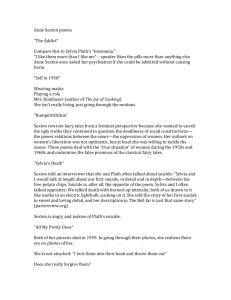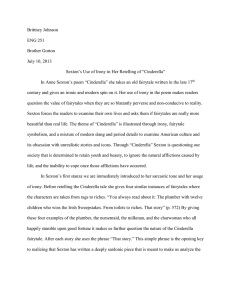File - Mary Wayland
advertisement
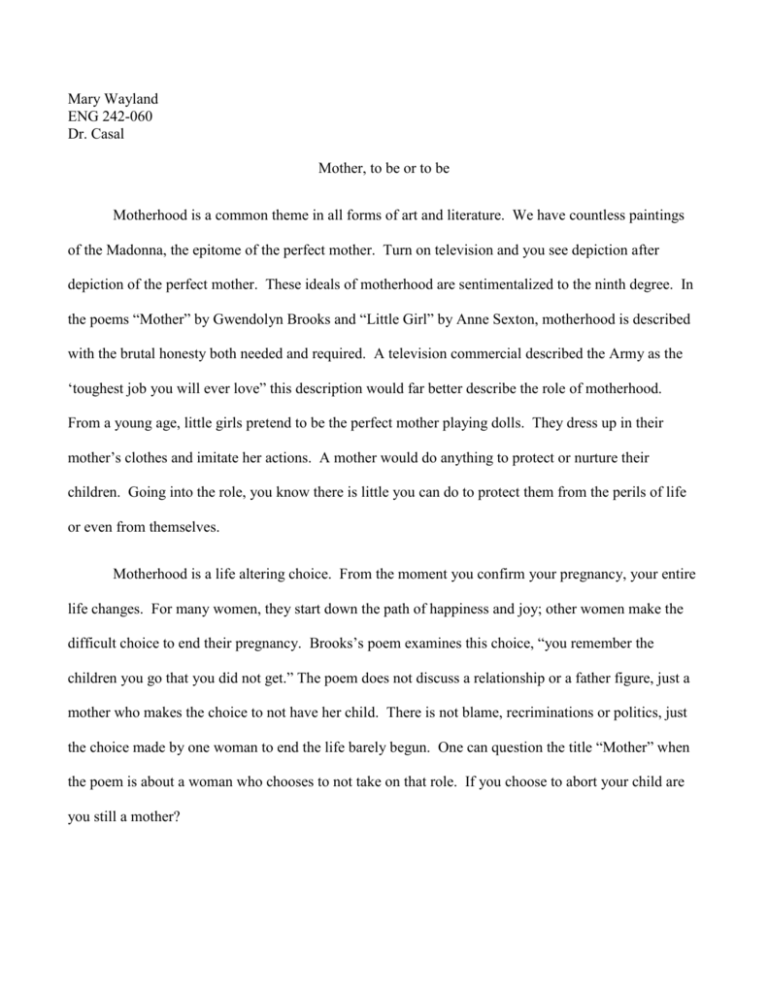
Mary Wayland ENG 242-060 Dr. Casal Mother, to be or to be Motherhood is a common theme in all forms of art and literature. We have countless paintings of the Madonna, the epitome of the perfect mother. Turn on television and you see depiction after depiction of the perfect mother. These ideals of motherhood are sentimentalized to the ninth degree. In the poems “Mother” by Gwendolyn Brooks and “Little Girl” by Anne Sexton, motherhood is described with the brutal honesty both needed and required. A television commercial described the Army as the ‘toughest job you will ever love” this description would far better describe the role of motherhood. From a young age, little girls pretend to be the perfect mother playing dolls. They dress up in their mother’s clothes and imitate her actions. A mother would do anything to protect or nurture their children. Going into the role, you know there is little you can do to protect them from the perils of life or even from themselves. Motherhood is a life altering choice. From the moment you confirm your pregnancy, your entire life changes. For many women, they start down the path of happiness and joy; other women make the difficult choice to end their pregnancy. Brooks’s poem examines this choice, “you remember the children you go that you did not get.” The poem does not discuss a relationship or a father figure, just a mother who makes the choice to not have her child. There is not blame, recriminations or politics, just the choice made by one woman to end the life barely begun. One can question the title “Mother” when the poem is about a woman who chooses to not take on that role. If you choose to abort your child are you still a mother? The opening line is “Abortions will never let you forget”, this suggests you never quite get over an abortion. Thirty years after abortion was legalized in the United States, it is still one of the most vehemently argued situations faced by a woman. Do politicians honestly believe that their attempts to force a woman to view her unborn fetus on a sonogram will guilt her into making a different choice. I have a strong opinion about those who want to outlaw abortion; don’t tell me what I can do with my body unless you plan to raise the child I want to abort. There is no guilt or hand wrenching over the decision made by “The Mother”, she knows she has to live with her decision. The audience for the poem is the unborn child. Brooks tells her child “since anyhow you are dead. Or rather, or instead, you were never made.” What could be a greater loss for a mother, being robbed of her child after being born or the lifetime of imaginings for the child that never was? “My dim dears at the breasts hey could never suck.” A parent is not supposed to bury their child, in Brooks’ poem, the mother does not even get the closure of a funeral, she describes her child as “the damp small pulps with a little or with no hair.” There is no chance for her to mourn and be surrounded by friends and loved ones to share her grief. How can a mother deal with her loss when most would argue there was no loss as all? We see support groups for parents that lose their children, are there these same groups for women who have abortions? If there are, would women go there knowing there could easily be pro-life demonstrators calling them ‘baby killers’. It does not seem likely there is anything that could be said or done to change the sense of loss for the mother. She will feel this loss for her entire life, nothing can remove or replace this pain. This work is brutally and almost painfully honest. One questions how Brooks got such a true sense of the feelings of a woman who chose abortion. “I have heard in the voices of the wind the voiced of my dim killed children.” This suggests there is no escape from the after effects of an abortion. “You were born, you had body, you died. It is just that you never giggled or planned or cried.” Is there any other way that a woman could explain the lack of a life to her aborted child? The persona of “The Mother” is clear, she is a mother even though she chose to not give birth to her child. Brooks end the work with “believe me, I knew you, though faintly, and I loved, I loved you all.” A mother is the one person who no matter all your failings, your victories and in betweens, will always know you and love you. In “My Little Girl” by Anne Sexton a different persona of motherhood is examined. This is a story of a mother with a daughter transitioning into womanhood. Themes examined in “My Little Girl” are similar to those examined in “The Mother”. The audience of both works is the children. Sexton addresses ‘Lynda’ “eleven, almost twelve” directly. The child her is a living breathing being, about to embark on her life. The advice given by her mother is not only for the child, it also suggests that Sexton is examining her own life, her choices and wishes she could live her life again, knowing what she knows now. “If I could have watched you grow as a magical mother might …the becoming-- while it becomes! as it does now, a world of its own, a delicate place.” Transitions in life always come with a price. Going from a baby to a child requires learning rules and consequences. Going from a little girl to a woman requires you to adapt to the changes of your body and self-actualization and loss of innocence. Sexton describes a market with fruits and vegetables “engorged” or “beginning to swell”, these are comparisons to the changes in the daughter’s body. She goes on to say “let the high noon enter, the hour of the ghosts”, these are ghosts of Sexton in the past or are these ghosts of her daughter’s future. The people she is bound to encounter in her life, the ghosts of love, loss, heartache and joy, and no amount of advice can protect your child. You best hope is to give them the tools they need to grow and to hope they learn to use them. Sexton examines the role of a mother is to guide, protect and support her children. “What I want to say, Linda, is that there is nothing in your body that lies. All that is new is telling the truth. I’m here, that somebody else, an old tree in the background.” The success of a mother is the success of her children. You would have a hard time finding a daughter who freely admits that she is like her mother. While it is the truth, a child wants to think they are a person independent of their parents. However, we are destined to follow many of the same paths of our parents. Eventually, you will find yourself saying something your mother said to you that you swore you would never say to your child. “Little Girl” seems to suggest the transition into womanhood is rebirth. “What I want to say, Linda, is that women are born twice.” It could also suggest Sexton is reliving her life through her daughter. “How can I say that I've known just what you know and just where you are?” She remembers her life as she tells her daughter about her inevitable future. They are a part of each other, always have been and always will be. There is nothing they could do to separate the connection they have. Neither poem is written in the classic mother tone. Brooks is writing to her aborted children and Sexton describes the pain and heartache of womanhood. They both admit their mistakes and shortcomings, something the sentimentalized version of a mother would not do. That mother would be perfect and would never have to deal with the reality and heartache described in these works. However, these mothers are the kind of mother every child would want as their own. A mother who loves them, living or dead, thinks of them and their well-being and hopes their choices will prevent their children from the pains of life.
